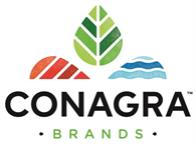CONAGRA BRANDS
page 9
place for specific brands at Pinnacle before the acquisition; risks related to Conagra Brands’ ability to deleverage on currently anticipated timelines, and to continue to access capital on acceptable terms or at all; risks related to Conagra Brands’ ability to execute operating and restructuring plans and achieve targeted operating efficiencies from cost-saving initiatives, related to the acquisition and otherwise, and to benefit from trade optimization programs, related to the acquisition and otherwise; risks related to the effectiveness of Conagra Brands’ hedging activities and ability to respond to volatility in commodities; risks related to the Company’s competitive environment and related market conditions; risks related to Conagra Brands’ ability to respond to changing consumer preferences and the success of its innovation and marketing investments; risks related to the ultimate impact of any product recalls and litigation, including litigation related to the lead paint and pigment matters, as well as any securities litigation, including securities class action lawsuits; risk associated with actions of governments and regulatory bodies that affect Conagra Brands’ businesses, including the ultimate impact of new or revised regulations or interpretations; risks related to the availability and prices of raw materials, including any negative effects caused by inflation or weather conditions; risks and uncertainties associated with intangible assets, including any future goodwill or intangible assets impairment charges, related to the acquisition or otherwise; the costs, disruption, and diversion of management’s attention due to the integration of the acquisition; and other risks described in Conagra Brands’ reports filed from time to time with the Securities and Exchange Commission. We caution readers not to place undue reliance on any forward-looking statements included in this document, which speak only as of the date of this document. We undertake no responsibility to update these statements, except as required by law.
Note onNon-GAAP Financial Measures
This document includes certainnon-GAAP financial measures, including adjusted EPS, organic net sales, adjusted gross profit, adjusted operating profit, adjusted SG&A, adjusted corporate expenses, adjusted gross margin, adjusted operating margin, adjusted effective tax rate, adjusted net income, adjusted net interest expense, free cash flow, net debt, adjusted equity method investment earnings, and adjusted EBITDA. Management considers GAAP financial measures as well as suchnon-GAAP financial information in its evaluation of the Company’s financial statements and believes thesenon-GAAP measures provide useful supplemental information to assess the Company’s operating performance and financial position. These measures should be viewed in addition to, and not in lieu of, the Company’s diluted earnings per share, operating performance and financial measures as calculated in accordance with GAAP.
Certain of thesenon-GAAP measures, such as organic net sales, adjusted operating margin, adjusted effective tax rate, adjusted net interest expense, adjusted EPS, net debt, and free cash flow, are forward-looking. Historically, the Company has excluded the impact of certain items impacting comparability, such as, but not limited to, restructuring expenses, the impact of the extinguishment of debt, the impact of foreign exchange, the impact of acquisitions and divestitures, hedging gains and losses, impairment charges, the impact of legacy legal contingencies, and the impact of unusual tax items, from thenon-GAAP financial measures it presents. Reconciliations of these forward-lookingnon-GAAP financial measures to the most directly comparable GAAP financial measures are not provided because the Company is unable to provide such reconciliations without unreasonable effort, due to the uncertainty and inherent difficulty of predicting the occurrence and the financial impact of such items impacting comparability and the periods in which such items may be recognized. For the same reasons, the Company is unable to address the probable significance of the unavailable information, which could be material to future results.
Hedge gains and losses are generally aggregated, and net amounts are reclassified from unallocated corporate expense to the operating segments when the underlying commodity or foreign currency being hedged is expensed in segment cost of goods sold. The Company identifies these amounts as items that impact comparability within the discussion of unallocated Corporate results.
